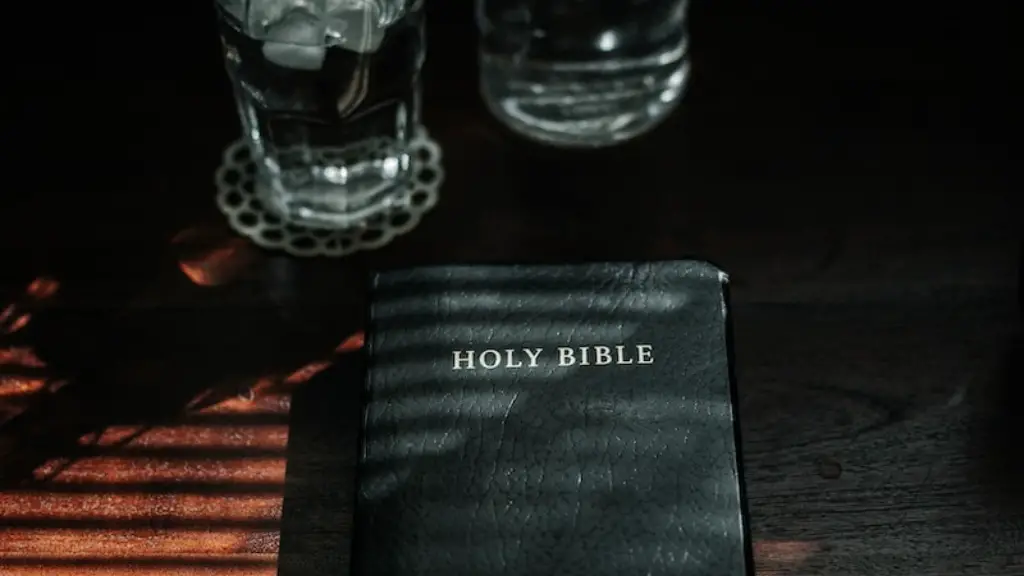Introduction:
The bible remains one of the most widely read religious texts in the world to this day. It contains timeless wisdom and guidance that has transcended generations, and has helped shape societies towards greater understanding, harmony, and peace. It also contains writings on controversial topics like homosexuality, which is why many wonder: Where in the Bible does it talk about homosexuality?
An Overview
The Bible contains both Old and New Testaments, so it can be difficult to pinpoint specific references to homosexuality. In the Old Testament, Leviticus 18:22 is the clearest reference to homosexuality: “You shall not lie with a male as one lies with a female; it is an abomination.” In the New Testament, the passages that mention homosexual behavior include Romans 1:26-27 and 1 Corinthians 6:9-10. In these passages, homosexuality is described as a sin, but the Bible also mentions many other sins like lying, stealing, and adultery.
Perspectives from Experts
There is no consensus among bible scholars and religious experts on the interpretation of these verses. The authority of any interpretation depends on an individual’s faith and relationship with God. When experts discuss the issue of homosexuality, they often place the verses in the context of the Old Testament’s condemnation of all forms of sexual practice outside of marriage between a man and woman.
Christian pastor and author, John Piper, suggests that because Jesus remained silent on the topic of homosexuality, we should turn to the Old Testament’s prohibition of same-sex relations. Based on this prohibition, he concludes that homosexual behavior is sinful. On the other hand, Christian activist and author, Allen Bergen, takes a more progressive stance. He argues that the passages in the Bible that mention homosexuality should be read in light of Jesus’ teachings on love and compassion.
Analysis & Insights
Many people have a preconceived notion that the Bible clearly states that homosexuality is a sin, but this is not necessarily the case. While some passages can be interpreted as condemning homosexuality, it is important to consider both contexts as well as the teachings of Jesus when making an interpretation.
The bible provides timeless teachings on how to live in harmony and peace, so it is important to ask ourselves if prohibiting same-sex marriage is congruent with these teachings. Couldn’t such a prohibition be considered discriminatory, and incompatibly with Jesus’s loving message? Does this mean that homosexuality is not a sin, or that it can be allowed under certain parameters?
We can explore further angles from a theological standpoint. For instance, some scholars point to the fact that the bible is full of instructions on how to live, but it is not an instruction book. It provides guidance, instructions, and prohibitions, but these coexist with the wider message of love and understanding. Consequently, it cannot be used as a tool to define morality as a black and white absolute.
Natural Law Argument
The natural law argument was developed by Augustine and Thomas Aquinas in reference to human rights and civil law. It states that laws should be guided by the nature of things and not by human will. It is based on the principle of private law or divine law, which means that the law should derive from God’s will. Thus, it follows that what God forbids should be avoided.
God’s will is expressed with absolute clarity in the Bible and so, in this light, homosexuality is considered a sin. Catholic sensibilities are also very important in the interpretation of the verses censoring homosexuality. The Church’s orientation is very important for their own interpretation, as it is in line with what has been handed down from ‘tradition’.
Religious Exemptions from Civil Law
The topic of same-sex marriage is highly sensitive and can become a source of major conflict between civil laws and religious beliefs. In some countries, religious exemptions are used to protect individuals and groups who believe homosexuality is a sin and who oppose same-sex marriage on the basis of their religious convictions.
Religious exemptions are usually only granted to organizations, not individuals, and they must have a demonstrable connection to the religion in question. The exemptions usually apply to matters of education, immigration, and housing, but they can extend to healthcare and other areas.
Comparative Studies & Literature Reviews
Much of the research focusing on homosexuality in the bible is based on comparative studies and literature reviews. Comparative methodology is used to gain a better understanding of the Bible’s stance on homosexuality, by comparing the verses related to same-sex behavior in different translations.
This methodology is also used to gain insight into how specific verses are interpreted in various religious contexts, such as Christianity, Islam, and Judaism. By understanding the various interpretations, we can gain a deeper understanding of how the Bible speaks to us about homosexuality.
Individual Drawing
The bible provides us with guidance but ultimately, it is up to individuals to draw their own conclusions. The bible is open to interpretation and every individual has their own opinion on what the Bible says about homosexuality. Ultimately, these opinions should be respected, as they are based on individual beliefs and experiences.
It is important to consider the Bible’s broader message of love and acceptance, while recognizing the need to respect the autonomy and beliefs of others. This will help create a more harmonious and understanding society, regardless of our religious beliefs.
Discrimination & Equal Protection Clause
When considering the topic of homosexuality in the Bible, we should also remember that civil laws also come into play. Civil laws were created to ensure fairness and to protect people from discrimination, so we should question if it is fair to use the Bible’s verses on homosexuality to exclude certain people from civil rights, such as same-sex marriage.
In the United States, the Equal Protection Clause of the Constitution states that all Americans should receive equal protection under the law, regardless of their sexual orientation. This means that laws that discriminate against homosexuals based on religious beliefs should be struck down, as they deny equal protection under the law.
Conclusion
It is clear the Bible mentions homosexuality in a few verses, but it is up to the reader to interpret these verses in the wider context of respect and understanding. The Bible offers guidance, but it is ultimately up to individuals to draw their own conclusions.
Finally, it is essential to remember civil laws also come into play when considering legal rights and protections for all individuals, including those from the LGBT+ community. Discrimination based on sexual orientation is a violation of civil laws, so it is important for us to consider this as well when researching what the Bible says about homosexuality.


